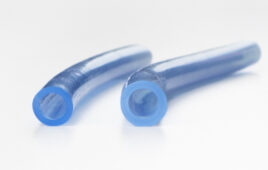
Touring a contract manufacturer’s clean rooms and other spaces will help you pick the right partner. [Photo courtesy of HS Design]
Choosing a contract design or manufacturing partner begins a long, two-way relationship.
Tor Alden, HS Design, a SteriPack Company
No matter what type of medical product you are designing, at one point you will be faced with deciding which design house or contract manufacturer is right for you. OEMs through highly funded startups all face the same issues when preparing to transition from design to manufacturing.
The design-through-manufacturing cycle is getting quicker. On average, the typical product development launch is two years from concept to regulatory approval. This two-year period may initially seem like a long duration, and you might not feel an urgent need to engage a medical solution partner, letting the selection decision wait until the development cycle matures. However, time after time, we have seen a tendency to rush the development process to get to a prototype without engaging molders or manufacturers, leading to disappointment in aesthetics, assembly methods and cost.
Proper and early due diligence is especially important if you are a startup. Your organization might not yet have approved suppliers, the discipline to review past vendors, or even have experienced staff on hand. Startups are lean and fast-moving by nature. Once the startup receives its Series A or B funding, the plan is to get to market as fast as possible. Does the company have an experienced program manager on the team that can recognize the ideal solution providers, or do you risk the pitfalls of jumping in too soon with a supplier that does not fit? Likewise, the suppliers you may target could be apprehensive about taking on the project based on volumes, investment cost and strategy to market.
There are as many medtech, diagnostic, pharma and consumer health product developers as there are specialty contract manufacturers. So let’s look at the potential questions medtech designers and managers should ask when considering medical solution providers.
1. Is my contract manufacturer the proper size or scalable?
There is always a tendency for a company to overreach its growth goals. This idea relies on the assumption that a supplier with a global presence and high-volume capabilities will be safe as your production volumes grow. Even the most prominent companies fall into this trap.
It is ideal to find a global contract manufacturer that has reach for when your product grows, but acts with caution regarding initial volume and cost targets. Gauging a supplier’s hunger for your business is paramount. Sometimes a smaller contract manufacturer will not only be more aggressive in timelines but also jump through problems due to gaining that larger OEM. Ask the contract manufacturer to tell you what their units-per-year production sweet spot is and about their ability to scale up and down.
2. What are the specific capabilities my product needs?
The thought that all contract manufacturers are the same couldn’t be further from the truth. Depending on the product, it could include micro molding, assembly, complex fluidics, packaging, sterilization, clean room molding — the list goes on. Finding examples of what the supplier is currently doing is always a good first step. Make sure your supplier has a process in place for everything. Do they offer turnkey or consignment preferences? If final packaging is required, will instructions-for-use (IFUs) need to be provided? What additional services do they offer? Understanding the manufacturing partner’s safety, sustainability, supply chain and accessibility is essential.
3. Are regulatory and QMS systems in place?
In today’s highly competitive and regulated market, chances are you will have a medical solution partner meeting all the criteria on paper. However, how their QMS system is integrated and provides tracking can significantly differ, however. Look for a provider that can point to their quality and regulatory manager and have them discuss their certificates, traceability and capabilities for carrying inventory, quarantine and shipping. Are they GMP, ISO 13485 or FDA registered? Are their procedures regularly critiqued through internal notified bodies and customer audits? Strict quality management ensures consistent delivery and instills confidence in customers.
4. Does the solution provider offer holistic design-to-manufacturing services?
Even though you may have spent considerable time selecting your design firm, remember that some design firms are more manufacturing-focused than others. Integrating a design firm into a contract manufacturer will reduce the need for rework. Design and manufacturing processes differ, and ensuring the manufacturer is in meetings early will prevent rework. Do they have in-house molders, or do they rely on outsourced services? What is the knowledge of medical resins and prototype tooling?
5. Does your current product development partner have a track record with the contract manufacturer?
Most ISO 13485 medical-focused product development firms have vetted quality processes, but not all are user-centered or manufacturing-focused. If the firm lacks experience in molding and manufacturing, it may not have existing relationships with contract manufacturers. Early integration of the contract manufacturer with the product development firm is critical to make the experience as holistic as possible. Ideally, the medical solution provider can show successful case studies of projects transitioning from design firms to production.
The devil is in the details
Trust your instinct, but base it on facts. If possible, visually inspect the plant before selecting it to gauge the supplier’s quality from the looks of the tooling, molding and assembly floors — and even the front lobby. Resist the urge to select based on recommendations and slick presentations. Once you choose your medical solution provider, be prepared for a long-lasting, trusting relationship. The ability to move your product to another supplier once in production is a daunting process and will test the relationship between an OEM and the contract manufacturing partner. In addition, all the regulatory work, design history, tooling and material knowledge will need to be transferred, leading to another round of testing and validation.

Tor Alden [Photo courtesy of HS Design]
The opinions expressed in this post are the author’s only and do not necessarily reflect those of MedicalDesignandOutsourcing.com or its employees.




